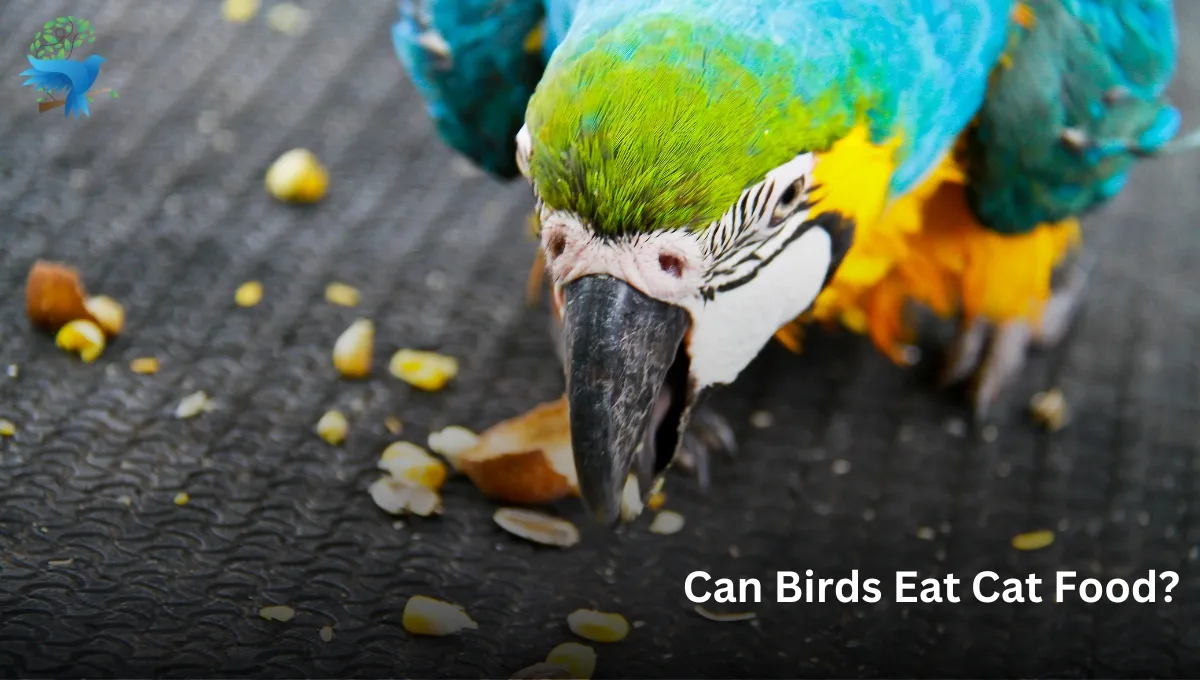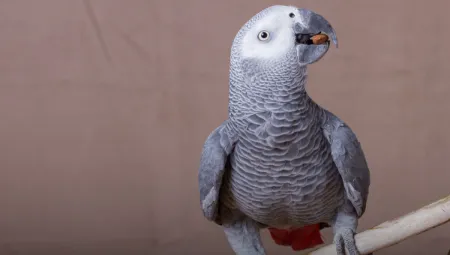Can Birds Eat Cat Food?

Whether birds can indulge in a cat food meal is a common curiosity for both bird enthusiasts and pet owners. However, it’s essential to recognize that birds and cats have distinct dietary requirements.
While sharing cat food with a bird may seem harmless, it carries potential risks and safety concerns. Birds thrive on a diet rich in seeds, insects, fruits, and grains, tailored to meet their unique nutritional needs.

Cat food is created mainly for cat dietary requirements with higher protein and fat levels, lacking critical components important for avian health.
Introducing cat food into a bird’s diet can disrupt the delicate balance of nutrients, potentially leading to health issues. Understanding the nutritional needs of birds is crucial for their well-being. Let’s investigate this topic to determine whether cat food suits our avian friends.
Can Birds Eat Cat Food?
While some birds may be attracted to the protein content in dried cat food, it’s not an ideal dietary option for birds due to the potential nutrient imbalances and choking hazards.
Cat food is created to meet the nutritional needs of felines, and its composition may not align with the essential nutrients required by birds.
Furthermore, the dry and hard texture of cat food can pose a choking risk to birds, especially smaller species, potentially leading to deficiencies and health issues in birds.
Bird caregivers must be mindful of the unique dietary requirements of their avian companions to promote a long and healthy life.
Bird Diets
Birds exhibit diverse dietary preferences based on their species, generally falling under the category of omnivores, though this can vary.
Birds’ nutritional needs are met through a well-balanced diet encompassing grains, fruits, vegetables, and protein sources. Unlike the protein found in cat food, birds often derive this essential nutrient from natural sources such as insects and seeds.
Understanding and respecting these distinct dietary requirements contribute significantly to the well-being of our avian companions.
Read More: Can Birds Eat Sesame Seeds?
Overview of Cat Food
Cat food is precisely created to fulfil the nutritional needs of our feline companions. It is available in various forms, such as dry kibble, moist canned alternatives, and specialist formulae.
Cat food, which contains a well-balanced combination of proteins, fats, carbs, vitamins, and minerals, is critical in supporting a cat’s growth, overall health, and sustenance. The numerous formulas on the market are designed to meet specific feline needs, ensuring cats obtain the vital nutrients required for their distinct physiology.
The entire nutritional profile of cat food emphasizes its relevance in preserving the well-being of our beloved feline friends, from fostering healthy coats and skin to supporting normal muscle growth.
Nutritional Comparison – Bird Food VS Cat Food
Comparing the nutritional content of cat food with a bird’s dietary requirements reveals significant disparities. Cat food typically boasts higher levels of protein and fat, ranging from 26-30% in dry food, 10-15% in wet food for protein, 10-20% in dry food, and 5-10% in wet food for fat.
Similarly, carbs range from 30-40% in dry food (typically less in wet food because it is mainly made up of water). While cats require specific amino acids like taurine and arginine, abundant in cat food, these levels exceed what is suitable for birds.
In contrast, birds, whose diets vary by species, generally need lower protein and fat content, such as 10-15% protein and 4-5% fat for seed-eating birds. Moreover, carbohydrates range from 50-60%, which is higher than cat food.
Insectivorous birds may require higher protein levels, but still not as high as those found in cat food. Moreover, cat food lacks certain essential nutrients for birds, including specific vitamins and antioxidants like vitamin A, which are naturally present in fruits and vegetables vital to many avian diets.
Risks of Birds Eating Cat Food
Feeding birds cat food poses significant risks due to the mismatch in nutritional requirements. The lack of essential minerals and vitamins and the potential for excessive protein and fat content create a concerning imbalance for avian health.

This health disparity may display severe consequences, including liver and kidney problems arising from the high protein load, as well as the risk of obesity due to the high-fat content.
For birds, obesity poses a particular threat, affecting their ability to fly and potentially leading to fatty liver disease. Additionally, including certain ingredients in cat food, such as high sodium levels, artificial additives, and preservatives, can harm birds’ overall well-being.
The absence of specific amino acids and micronutrients crucial for birds may compromise their immune systems and contribute to poor feather quality, further jeopardizing their overall health and survival.
Bird caregivers should exercise carefulness in choosing a nutritionally appropriate diet to safeguard the well-being of their feathered companions.
How to Prevent Birds from Eating Cat Food?
Preventing birds from eating cat food requires strategic placement of feeders and food containers to make them inaccessible to cats.
It’s crucial to designate specific areas for bird feeders, ensuring they are positioned in locations cats cannot easily reach.
Using elevated or hanging feeders can be effective in deterring feline access. Opting for bird-specific food in the feeders eliminates the risk of birds accidentally consuming cat food.
This proactive approach not only safeguards the avian visitors but also promotes a balanced and species-appropriate diet for cats and birds, contributing to a harmonious coexistence between these two groups of animals.
Alternative Foods for Birds:
Providing birds with a varied and nutritious diet is essential for their well-being, and tailoring their food to their natural dietary preferences ensures they receive the necessary nutrients for optimal health. Different bird species exhibit distinct nutritional habits, and understanding these preferences is crucial in creating a suitable feeding regimen.
For instance, hummingbirds thrive on a diet of nectar from flowers, supplemented with insects and spiders, while seed-eating birds like finches and sparrows benefit from a mix of seeds, grains, and plant matter.
Insectivorous birds such as warblers and flycatchers require diets rich in insects, larvae, spiders, and small invertebrates. Birds of prey, like hawks and eagles, thrive on small mammals, birds, reptiles, and fish.
Water birds such as ducks and swans consume aquatic plants, algae, small fish, and invertebrates, while frugivorous birds like pigeons and fruit doves enjoy a diet consisting primarily of fruits and berries, occasionally supplemented with insects.
By aligning bird feeding practices with their natural diets, enthusiasts can promote the health and vitality of their avian visitors.
Conclusion
In conclusion, while birds may show interest in cat food, it’s not suitable or safe for their consumption. Understanding the distinct dietary requirements of both birds and cats is crucial for maintaining the health and well-being of these diverse creatures.
While considering whether birds can indulge in cat food might be a common curiosity, the significant nutritional differences pose potential risks and safety concerns for avian health.
Cat food, tailored specifically for feline dietary needs, contains higher levels of protein and fat, lacking essential components vital for bird health.
Introducing cat food into a bird’s diet can disrupt the delicate balance of nutrients, leading to various health issues. So, selecting bird-specific foods and preventive measures will ensure our feathered friends lead healthy lives.
References:
Can Birds Eat Cat Food? When Is It Safe For Birds?
Can Birds Eat Cat Food? Unleashing the Potential: Feasibility, Benefits, and Risks
FAQs
Is cat food good for birds?
No, cat food is not suitable for birds. It is formulated for feline nutritional needs and contains higher levels of protein and fat, which may lead to imbalances in essential nutrients for birds. Additionally, the texture can pose a choking hazard. Birds benefit from a diet rich in seeds, fruits, and grains.
Are there health risks to eating cat food for birds?
Yes, there are health risks associated with birds eating cat food. Cat food is made for the specific nutritional needs of cats, containing higher levels of protein and fat. Birds consuming cat food may experience nutrient imbalances, leading to potential health issues such as liver and kidney problems, obesity, and compromised immune systems.
What should birds eat instead?
Birds benefit from a diet rich in seeds, fruits, vegetables, and grains. Providing bird-specific food in designated feeders ensures they receive the proper nutrition tailored to their species.






